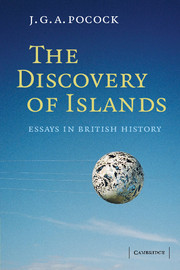Book contents
- Frontmatter
- Contents
- Preface and acknowledgements
- Note on bibliographies
- PART I THE FIELD PROPOSED
- PART II THE THREE KINGDOMS AND THE ENGLISH PROBLEM
- PART III EMPIRE AND REBELLION IN THE FIRST AGE OF UNION
- 7 Archipelago, Europe and Atlantic after 1688 (2003)
- 8 The significance of 1688: some reflections on Whig history (1991)
- 9 Empire, state and confederation: the War of American Independence as a crisis in multiple monarchy (1995)
- 10 The Union in British history (2000)
- PART IV NEW ZEALAND IN THE STRANGE MULTIPLICITY
- PART V BRITAIN, EUROPE AND POST-MODERN HISTORY
- Bibliographies
- Index
8 - The significance of 1688: some reflections on Whig history (1991)
Published online by Cambridge University Press: 05 June 2012
- Frontmatter
- Contents
- Preface and acknowledgements
- Note on bibliographies
- PART I THE FIELD PROPOSED
- PART II THE THREE KINGDOMS AND THE ENGLISH PROBLEM
- PART III EMPIRE AND REBELLION IN THE FIRST AGE OF UNION
- 7 Archipelago, Europe and Atlantic after 1688 (2003)
- 8 The significance of 1688: some reflections on Whig history (1991)
- 9 Empire, state and confederation: the War of American Independence as a crisis in multiple monarchy (1995)
- 10 The Union in British history (2000)
- PART IV NEW ZEALAND IN THE STRANGE MULTIPLICITY
- PART V BRITAIN, EUROPE AND POST-MODERN HISTORY
- Bibliographies
- Index
Summary
‘Well, doctor,’ William of Orange is said to have remarked to Gilbert Burnet, as they stood on Brixham beach on 5 November 1688, ‘what do you think of predestination now?’ The jest, if it was one, might be taken as referring to the extraordinary series of physical events which had brought them where they were – to the multiple changes of the Protestant wind, blowing them east, west and east again; or it might refer to the no less extraordinary series of contingencies in church, state and dynasty which had led to William's being invited to England and had made it worth his while to set out thither; or finally, it might be taken as indicating that neither William nor Burnet at that moment could have had the least idea what was about to happen. With the benefit of hindsight, we know; and we know also that William had done his best to ensure that some things should happen which did in fact happen. We are therefore tempted to see the outcome of William's expedition as a foregone conclusion, which is to know more about predestination than William or Burnet did. A warning against ‘Whig history’ in a very crude sense may therefore be uttered at the outset of this essay. William was a careful planner, but careful planners in military and political affairs are at the same time very daring gamblers, and he was engaged on a gamble of a quite breathtaking nature.
- Type
- Chapter
- Information
- The Discovery of Islands , pp. 114 - 133Publisher: Cambridge University PressPrint publication year: 2005



